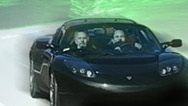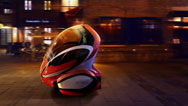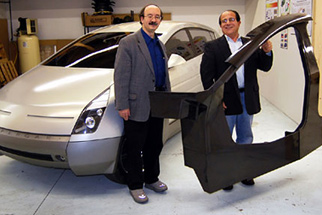Really Smart Cars
- By Susan K. Lewis
- Posted 04.22.08
- NOVA
Energy expert Amory Lovins tends to be ahead of the curve when it comes to thinking about cars. In the early 1990s, he said we should all be driving fuel-efficient, lightweight vehicles, like some we're just starting to see on our roads. So what does he think we're in store for now? You might call them smart cars. Really smart cars.
This feature originally appeared on the site for the NOVA program Car of the Future.
Transcript
Really Smart Cars
Posted April 22, 2008
SUSAN LEWIS: You're listening to a NOVA podcast. I'm Susan Lewis.
Energy expert Amory Lovins tends to be ahead of the curve when it comes to thinking about cars. In the early 90s, he said we should all be driving fuel-efficient, lightweight vehicles, like some we're just starting to see on our roads. So what does he think we're in store for now? You might call them smart cars. Really smart cars.
AMORY LOVINS: If for example I climb into my car on a Monday morning, maybe it should tell me, "Hi, Amory, over the weekend, I downloaded a new piece of software that will improve your handling in hard cornering. Do you want to try it? And if you don't like it, we can take it out later." So I say, sure, try it. So what installs is a little applet that takes information from sensors I've already got, performs a calculation on them, and sends the result to actuators I've already got.
In other words, you could do the tune-ups, the diagnostics, and continuous improvement in your car's software system wirelessly in background.
SUSAN LEWIS: Automatic software upgrades? In a machine that takes me down the highway at 60 miles an hour? I have to say—and I told Lovins—the whole idea makes me a little nervous. But Lovins says that not only will these cars be smarter, they'll be safer, as well.
AMORY LOVINS: I've been saying for about 15 years that any car too dumb to call 911 when the airbags deploy isn't worth buying. And it ought to tell the 911 people what decelerations occurred, what year, make, and model you've got so they'll know how to get you out of it, and exactly where you are and how many people were in the car so they'll know how to come prepared. You know, there's a lot of stuff you can do beyond navigation, and traffic management, and telling you whether you have enough air in the tires that would make you safer, it would help prevent accidents, and help get you out in a hurry if you have an accident.
SUSAN LEWIS: Today's cars and trucks may have navigation software, but it's completely separate from the software that runs your transmission or audio system. Lovins says that in the future, a vehicle should have only one central computer.
AMORY LOVINS: I think we're going to look back on today's generation of cars with maybe a dozen or two processors, and say, "Boy, that was pretty crude." It was really a band-aid solution where each different function of the car had its own computer. Well, now we have one computer that does everything, it does it so slickly we don't even notice it's going on, and the car is really smart. Like, if it notices that I'm maneuvering on black ice, it's not going to interrupt me with a phone call. It'll take a message and tell me later.
SUSAN LEWIS: I find everything Lovins says fascinating, but I have to admit—the idea of getting in my car in the morning and installing a new piece of software still seems a little scary. After all, when the computer on my desk crashes, it's still just sitting on my desk. But the computer in my car?
AMORY LOVINS: Well, you obviously do not want to reboot your car as it heads towards a tree. And we need a very different level of reliability that users of certain computers have come to expect. We all know that some kinds of software are better than others, and we need to be very demanding about the reliability and security of the software we use so that somebody can't, you know, crack into my car system and make it do weird things. I know that when the software comes in wirelessly in background, it really did come from the manufacturer and was thoroughly tested before it installs.
SUSAN LEWIS: In the end, Lovins had me convinced. If I can get comfortable with the idea, a really smart car would certainly make my life easier.
AMORY LOVINS: Imagine not having to take your car to the shop to check why the engine light is on, because your car already did its diagnostics and tune-ups wirelessly and you didn't even know it was going on. And if something goes wrong, your car will tell you exactly what it is and whether it's important to go to the shop right away. And if it is, the shop will already have the part, because the car already ordered it.
Credits
Images
- (all images)
- Courtesy Joe Seamans/© WGBH Educational Foundation
Related Links
-

Car of the Future
Join the "Car Talk" guys as they hit the road in search of a new breed of clean, fuel-efficient vehicles.
-

Robotic Cars
Tiny, battery-powered cars called EN-Vs, now in R&D, can talk to each other, come when called, even drive themselves.
-

Cars That Drive Themselves
Roboticist Sebastian Thrun shares his excitement about real-world applications for autonomous vehicles.
You need the Flash Player plug-in to view this content.


